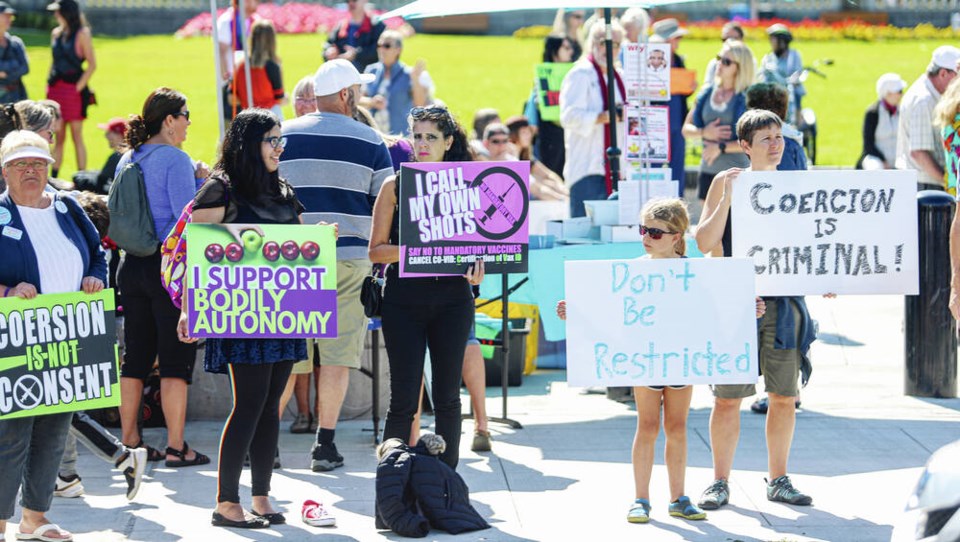In what may be a first for B.C., two women with physical disabilities have filed a constitutional challenge to the provincial government’s COVID-19 vaccine cards.
But a former B.C. attorney-general asked to comment on the case cautioned that charter rights are not absolute and the government would likely argue that any infringement of the petitioners’ rights would be justified to prevent further harm caused by the pandemic.
The B.C. Supreme Court petition filed by Sarah Webb and Leigh Anne Eliason seeks a number of court orders including an injunction staying the legal effect or enforcement of the vaccine card orders.
Webb, a 39-year-old mother of two who lives and works in both Victoria and Calgary, says she got her first COVID-19 vaccine shot on May 2 but developed a reaction that included fatigue, cramping, heart arrhythmia and severe pain.
She says she went to the emergency department of a hospital in Calgary, was prescribed antibiotics and released but the following day had further complications and went to another hospital where an emergency physician advised her that given her reaction, she should not receive a second vaccination.
In September, she says, her own physician confirmed in writing that as a result of the severe reaction to the first COVID shot, she was to avoid further doses of the vaccine.
Eliason, a 41-year-old mother of two from Maple Ridge with a “complicated and difficult” medical history, says that in May, her doctor advised her not to receive a COVID vaccination due to her medical problems.
As a result of the advice from their doctors, the two women have physical disabilities that give them a medical exemption from receiving further vaccine injections, argues their petition.
“Each respective physician expressly raised concerns that neither the government nor any of the provincial medical associations have provided guidelines or information as to how to properly write an exemption letter in these circumstances, or what information should be included in such a letter.”
B.C. residents are required to have a vaccine card in order to participate in many activities such as eating in a restaurant, working out in a gym or attending a concert. Residents need proof they have received two vaccinations to get the cards.As the measure is intended to be temporary and applies to non-essential activities, the province has not been making exceptions for people who cannot be safely vaccinated.
The petition says that the two women have followed each of the physical distancing, hand washing and mask-wearing procedures required by health authorities and neither has tested positive for COVID-19.
“There is no evidence to suggest that the Attorney General of British Columbia or British Columbia (ministry of heath) have considered individuals like the petitioners in making the vaccine card announcement or in crafting the vaccine card orders.”
The vaccine card orders deprive the petitioners of their Charter protected rights and freedoms and any enforcement of the orders unjustly impairs their rights and the rights of other members of the public to gather and engage in public life, says the petition.
Procedures for people seeking a reconsideration of the need for a vaccine card are “vague, ambiguous, and lack clarity,” it says.
“In essence, the vaccine card orders strip the petitioners of their fundamental freedoms and rights protected by the Charter and then require the petitioners proceed through a vague, ambiguous, arbitrary, onerous and indeterminate process to retrieve them.”
Robert Hawkes, a Calgary lawyer representing the petitioners, declined to comment on the case.
Barry Penner, a lawyer and former attorney-general in B.C., noted that in Canada, Charter rights are not absolute and the Charter provides for reasonable limits on those rights.
In the context of a Charter challenge to the vaccine cards, the courts will look at whether any infringement of rights is justified and at the social harm the government is attempting to prevent, he said.
“And in the case of Canada now, I think 28,000 deaths have been attributed to COVID-19 and in British Columbia we’re now over 2,000 deaths I think. So that’ll be, I would expect, some of the evidence the government would tender in response.”
Penner said he didn’t like to predict the outcome of the case but added it was “inevitable” someone was going to challenge the vaccine cards as there have been challenges to other COVID health measures.
“This will be very closely watched by interested lawyers but I think also the general public.”
A spokesperson for the Attorney-General Ministry said by email statement that they had not been served with the petition.
“The Province and the Provincial Health Officer fully respect British Columbians’ constitutional rights and freedoms,” said the statement.
“We are taking the steps necessary to address and mitigate the effects of the ongoing COVID-19 pandemic on all British Columbians. As the issue of proof of vaccination may be before the courts, we are not in a position to comment further.”



